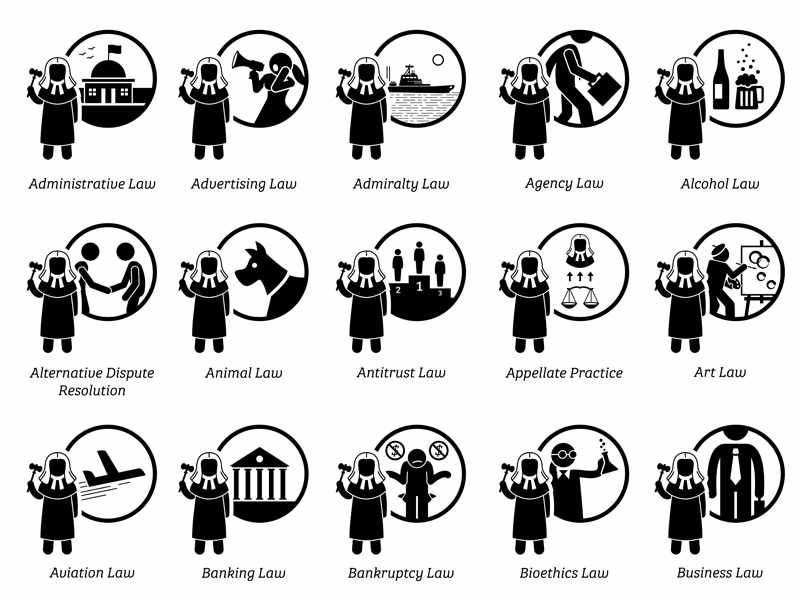
Do Not Get Bad Grades in College
Importance of Good Grades
Graduating from a top undergraduate school is an excellent achievement, but it is not enough on its own. Law schools look for high academic performance, and your grades play a crucial role in your acceptance into a prestigious law school.
Strategies for Academic Success
- Effective Study Habits: Develop strong study habits and time management skills.
- Seek Help: Utilize tutoring and academic resources offered by your school.
- Engage in Class: Actively participate in classes and seek to understand the material deeply.
Consequences of Poor Grades
Poor grades can severely limit your options for law school, reducing your chances of getting into a top-tier institution. This, in turn, affects your ability to secure positions at major law firms.

I did not study that hard in college, figuring that just graduating from an Ivy League school would be enough. Well, it is not enough. If you are serious about getting a job with a large law firm, you must get into a really good law school, and one of the best ways to do that is to have top grades from your undergrad institution. I did not have good enough grades to get into a top law school. I could have overcome that, but I did not.
Do Not Take a Lot of Time Off Between College and Law School
Pros and Cons of Taking Time Off
While some time off can be beneficial if you need to bolster your application with better grades or relevant experience, taking too long can be detrimental.
Ideal Timing for Law School Applications
Applying in Senior Year: Ensure that your most recent grades are included in your application.
Limited Time Off: Aim for one to two years if you need a break; longer gaps can make you an older candidate compared to your peers.
Impact of Delayed Law School Entry
Entering law school significantly later can lead to age disparities with your peers and superiors, potentially affecting your experience and opportunities as a first-year associate.

Many people take time off between college and law school. It may help if you did not get the best grades in college or your best grades were in senior year, where the law school would see them on the application, as opposed to applying to law school in your senior year, when those grades are not available. But it would help if you did not take too much time off because then you would be old as a first-year associate. Most senior associates, who would be your bosses and give you assignments, would be younger than you. I took off seven years, and that was probably a bit too long.
Do Not Aim To Get Low Law School Admission Test (LSAT) Scores
Importance of the LSAT
The LSAT is a critical component of your law school application, and a high score can significantly enhance your prospects.
Preparation Strategies
LSAT Prep Courses: Invest in a reputable LSAT prep course.
Practice Tests: Regularly take official practice tests to familiarize yourself with the exam format and time constraints.
Study Resources: Utilize books, online resources, and study groups.
Impact of LSAT Scores
Your LSAT score directly influences your competitiveness for top law schools. Even a few points can make a substantial difference in your acceptance chances.

Do Not Forget To Enroll In The Best Law Schools
Importance of Attending a Top Law School
Graduating from a top 15 or 20 law school significantly increases your chances of landing a job at a prestigious law firm.
Factors to Consider When Choosing a Law School
Ranking: Higher-ranked schools generally offer better career prospects.
Reputation: The school's national reputation can impact your job opportunities.
Alumni Network: A strong alumni network can provide valuable connections.
Personal Experience and Mistakes
My decision to attend Fordham instead of potentially waiting for Cornell impacted my career opportunities. Always aim for the highest-ranked school you can get into.
Believe That All Your Grades In Law School Are Equally Important And Your Overall GPA Is What Matters The Most
Focus on First-Year Grades
First-year grades are crucial because they are the primary basis for summer associate position interviews.
Strategies for First-Year Success
Prioritize Studies: Focus entirely on your studies during your first year.
Understand Exam Formats: Familiarize yourself with the types of questions and exam formats used in your courses.
Seek Feedback: Regularly seek feedback from professors to improve your performance.
Long-Term Impact of First-Year Performance
Strong first-year grades can lead to summer associate positions, which are often precursors to full-time offers from major law firms.

If you want to work for the largest law firms, you have to get into the top fifteen or twenty best law schools. Or graduate as a magna cum laude and/or be on the law review in a "lesser" law school. But because one is not guaranteed to graduate magna cum laude or make it in a law review, even among “lesser competition” in an “easier” law school, your best bet is to go to a top law school. This is another mistake I made. I got rejected from NYU Law School, got wait-listed, and then did not get into Columbia, and I was also wait-listed from Cornell but got into Fordham. I had not intended to apply to Cornell, but being an undergrad alumnus there, Cornell sent me an unsolicited law school application. When I got wait-listed by Cornell and admitted into Fordham, I told Cornell to take me off the waiting list. This was an incredibly stupid decision. Of course, there is no guarantee that I would have gotten into Cornell, but Fordham was ranked 29th at the time, and Cornell was ranked 16th. Since then, Cornell has been ranked as high as tied for tenth but has never fallen out of the top twenty. On the other hand, Fordham went up to a tie for 25th, but then dropped to as low as forty and is usually ranked in the low thirties. Throw in Cornell's national reputation compared to Fordham, and I would have been much better off if I attended Cornell (if I had gotten in) over Fordham. The best law schools play an integral part when it comes to working in big law firms.
Do Not Forget To Explore Other Options Once You Have Been Admitted Into A Law School (That Is Not In The Top Twenty)
Benefits of Night Programs and Transfers
If you are admitted to a law school with a night program, consider the potential to transfer to the day program or another higher-ranked school after your first year.
Strategies for Transferring
Excel in First-Year Courses: High grades can improve your chances of transferring.
Research Transfer Policies: Understand the transfer policies of the schools you are interested in.
Maximizing Opportunities
Exploring these options can open doors to better schools and, consequently, better career opportunities.

Do Not Start Working In An Area Of Law You Do Not Like
Importance of Early Career Choices
Your first job can set the trajectory for your career, so it's important to choose an area of law that interests you and is in demand.
Strategies for Finding the Right Fit
Internships and Clerkships: Gain experience in different areas of law through internships and clerkships.
Networking: Speak with professionals in various fields to understand the day-to-day realities of different legal practices.
Self-Assessment: Reflect on your interests and strengths to determine the best fit.
Long-Term Career Impact
Starting in a field you enjoy increases job satisfaction and career longevity, making it easier to build a successful and fulfilling legal career.

In my second year of law school, I learned two additional facts I wish I had known before starting law school. First, law schools with a night program allow their students to transfer from their night programs to the day programs after the first year by taking a course over the summer and then taking an extra course in the second year. Most highly ranked law schools do not have a night program, so this advice does not apply to most aspiring law students. But Fordham is one of the highest-ranked schools with a night program, and I discovered that many evening students – who claimed to be working full time during the day – had actually quit their jobs and were taking a lesser load of courses that they would have more time to study. They would naturally do better than their evening division peers who were working and did not have as much study time, and then they transferred to the day division and finished up in three years. The other fact is that it is possible to transfer to another law school after the first year. If I had known this, and with my top grade in criminal law, I could have maybe transferred into Columbia, like one student I knew did.

While one does not have a major or specialize in law school (other than patent law, which requires one to have a bachelor of science and then requires passing the patent bar as well), once you start your career after law school, you often can get “locked” into the field you first practice in, unless you make a change within the first 6-9 months. Of course, this ran counter to what my school’s career advisers told me, which was not to switch jobs right away, especially as your employer might be a fellow alumnus, and that is one of the reasons you got the job (which was the case with me), and that it was not a good idea to burn bridges. But because the chances of getting a job with a major firm are already slim to none without a summer associate or actual associate position under your belt, the experience you get will only be relevant or helpful to another large firm if it is in demand.
Conclusion
By avoiding the mistakes I made and following the strategies outlined in this article, you can significantly improve your chances of succeeding in your legal career. Focus on achieving top grades, preparing thoroughly for the LSAT, choosing the best possible law school, and making informed career choices. Remember, your early decisions will shape your future opportunities, so plan wisely and aim high.
Frequently Asked Questions (FAQ)
Q: Why are good grades in college important for getting into a top law school?
Good grades in college demonstrate your academic abilities and work ethic, which are critical factors law schools consider during the admissions process. High grades increase your chances of being accepted into a prestigious law school, which in turn enhances your career prospects in top law firms.
Q: How much time off should I take between college and law school?
Taking one to two years off between college and law school can be beneficial, especially if you use that time to improve your application with relevant work experience or better grades. However, taking too much time off can make you an older candidate compared to your peers, which might affect your experience and opportunities as a first-year associate.
Q: How important is the LSAT score for law school admissions?
The LSAT score is extremely important as it is a standardized measure of your aptitude for law school. A high LSAT score can significantly boost your chances of getting into a top law school. Investing in LSAT prep courses and taking practice tests are crucial steps to achieving a high score.
Q: What should I consider when choosing a law school?
When choosing a law school, consider its ranking, reputation, and the strength of its alumni network. Attending a higher-ranked law school generally offers better career prospects and job opportunities at prestigious law firms.
Q: How crucial are first-year law school grades?
First-year law school grades are very crucial because they are often the primary basis for summer associate position interviews. Strong first-year grades can lead to summer associate positions, which are often precursors to full-time offers from major law firms.
Q: Can I transfer to a higher-ranked law school after my first year?
Yes, transferring to a higher-ranked law school after your first year is possible if you achieve high grades during your first year. Research the transfer policies of the schools you are interested in and excel in your courses to improve your chances of transferring.
Q; How do I choose the right area of law to practice in?
To choose the right area of law, gain experience through internships and clerkships in different legal fields, network with professionals, and reflect on your interests and strengths. Starting in an area of law that interests you and is in demand can lead to greater job satisfaction and career success.
Q: What should I do if I don't get a job lined up after law school?
If you don't have a job lined up after law school, don't panic. Take the time to find a position that interests you or is in demand by large firms. Avoid taking the first job offer if it does not align with your career goals, as early career choices can set the trajectory for your future in law.
Q: Is it important to attend a law school with a night program?
Attending a law school with a night program can offer flexibility, especially if you need to work during the day. Some students use night programs to take a lighter course load and perform better academically, which can enhance their opportunities to transfer to a day program or a higher-ranked school.
Q: What should I do if I start working in an area of law I don't like?
If you find yourself working in an area of law you don't like, try to make a change within the first 6-9 months. Early career changes are easier to manage and can prevent you from getting locked into a field that doesn't interest you. Consider seeking advice from career advisors and exploring other opportunities that align with your interests.
Q: How can I improve my chances of getting into a top law school if my undergraduate grades aren't stellar?
If your undergraduate grades are not as high as you'd like, you can improve your chances by scoring exceptionally well on the LSAT, gaining relevant work or volunteer experience, securing strong letters of recommendation, and writing a compelling personal statement that highlights your strengths and unique experiences.
Q: What are some effective study strategies for achieving high grades in college?
Effective study strategies include creating a study schedule, attending all classes, actively participating in discussions, forming study groups, using flashcards and other study aids, seeking help from professors or tutors when needed, and regularly reviewing your notes and course materials.
Q: Should I work during my first year of law school?
It is generally advised not to work during your first year of law school. First-year grades are crucial, and working can take valuable time away from your studies. Focus entirely on your academic performance to maximize your grades and future opportunities.
Q: How can I prepare for law school during my undergraduate years?
Prepare for law school by taking courses that develop critical thinking, writing, and research skills. Participate in extracurricular activities such as debate club, student government, or internships in legal settings. Additionally, start preparing for the LSAT early and seek out mentors who can provide guidance.
Q: What should I include in my personal statement for law school applications?
Your personal statement should highlight your motivations for pursuing a career in law, your unique experiences, strengths, and accomplishments. It should be well-written, honest, and reflect your personality and passion for the legal field.
Q: How important are extracurricular activities for law school applications?
Extracurricular activities are important as they demonstrate your ability to manage multiple commitments, leadership skills, and passion for various interests. Participation in relevant activities such as moot court, internships, or volunteer work in legal settings can enhance your application.
Q: What is the best way to choose a law school if I have multiple offers?
When choosing between multiple law school offers, consider factors such as the school’s ranking, location, faculty, alumni network, career services, and financial aid packages. Visit the campuses if possible, and speak with current students and alumni to get a better sense of the school's environment and opportunities.
Q: How do I network effectively in the legal field?
Networking effectively involves attending industry events, joining professional organizations, participating in law school networking events, and connecting with alumni. Build genuine relationships by staying in touch and offering to help others when possible. Additionally, use platforms like LinkedIn to connect with professionals in your field of interest.
Q: What should I look for in a law school’s career services?
Look for a law school with a robust career services department that offers personalized career counseling, on-campus recruitment, job fairs, resume and interview workshops, and a strong network of alumni willing to mentor and support current students.
Q: Is it beneficial to participate in a law journal or law review?
Participating in a law journal or law review is highly beneficial. It demonstrates strong research and writing skills, which are valuable to employers. It also provides opportunities to work closely with faculty, improve your legal writing, and make your resume stand out to potential employers.
Q: How can I handle the stress and workload of law school?
Manage the stress and workload of law school by maintaining a balanced schedule, setting realistic goals, staying organized, and taking regular breaks. Engage in physical activity, hobbies, and social activities to unwind. Seek support from peers, family, and mental health professionals if needed.
Q: What should I consider when deciding to specialize in a particular area of law?
When deciding to specialize, consider your interests, strengths, the demand for the specialization, and potential career opportunities. Gain experience through internships, electives, and speaking with professionals in various fields to make an informed decision.
Q: How important is it to build relationships with professors in law school?
Building relationships with professors is very important. They can provide academic guidance, career advice, and strong letters of recommendation. Engage in class, attend office hours, and seek their mentorship to foster these relationships.
Q: What is the significance of summer associate positions?
Summer associate positions are significant as they often serve as a pipeline to full-time employment at law firms. These positions provide practical experience, allow you to showcase your skills, and give you a sense of the firm’s culture and work environment.
Q: How can I make the most of my law school experience?
Make the most of your law school experience by actively participating in class, joining student organizations, networking, seeking internships, and taking advantage of career services. Stay engaged with the law school community and continuously seek opportunities to learn and grow professionally.



